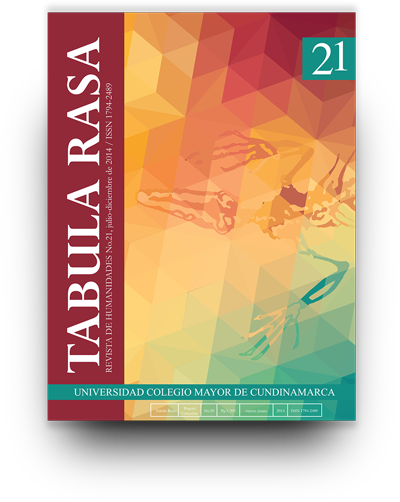La ruta atlántica del pensamiento afrodescendiente. Hacia un referencial teórico Afro sobre la historia de la trata transatlántica, la esclavitud perpetua y la invención del sofisma racial
The Atlantic route of Afro-descendant thought —Towards an Afro theoretical reference on the history of Trans-Atlantic slave trade, perpetual slavery and the invention of race sophism
Mostrar biografía de los autores
Este artículo tiene el propósito de presentar un referencial teórico escrito en las rutas del Atlántico por personas africanas y afrodescendientes, entre los siglos Xviii y XiX.
en particular se abordará la interpretación de tres procesos históricos relevantes en la historia de américa: la trata transatlántica, la esclavitud perpetua y la invención y uso
del sofisma racial. las autoras y autores que aquí señalaremos teorizaron las experiencias que atravesaron en el seno de sociedades esclavistas y racialistas en américa, el Caribe y europa a punto de forjar un pensamiento propio que está registrado en cartas, poemas, novelas, autobiografías y tesis académicas. Lo que aquí se propone es que estas versiones conforman un referencial teórico capaz de descolonizar la comprensión de la historia de la Diáspora africana en los centros educativos y académicos en américa.
Visitas del artículo 90 | Visitas PDF 68
Descargas
Bogues, Anthony. 2010. “Radical anti-colonial thought, anti-colonial internationalism and the politics of human solidarities.” En Shilliam Robbie (ed). International Relations
and Non-Western Thought Imperialism, Colonialism and Investigations of Global Modernity. New York, Routledge.
Cabral, Amilcar. 1980. A arma da teoría. Volumen 4 de Coleção Terceiro Mundo, Rio de Janeiro, CODECRI.
Chukwudi Eze, Emmanuel. 2001. «El color de la razón: La idea de ‘raza’ en la antropología de Kant». En Capitalismo y geopolítica del conocimiento. El Eurocentrismo y la filosofía de la liberación en el debate intelectual contemporáneo. Duke University, Buenos Aires, El Signo.
Cugoano, QuobnaOttobah. 2005 [1787]. Thoughts and sentiments on the evil and wicked traffic of the slavery: and commerce of the human species, humbly submitted to the inhabitants of Great-Britain. London, Michigan, University of Michigan Library. Disponible en: http://name.umdl.umich.edu/K046227.0001.001
Cugoano.Ottobah. 1825. Narrative of the Enslavement of OttobahCugoano, a Native of Africa. Published by himself, in the Year 1787. London, Hatchard and Co. and J. and A. Arch. Disponible en: http://docsouth.unc.edu/neh/cugoano/cugoano.html
Curtin, Philip. 1968. “Epidemiology and the Slave Trade”, en: Political Science Quarterly, 83 (2): 90-216.
Davis, Angela. 2004 [1981]. Mujeres, Raza y Clase. Madrid, Ediciones Akal. Diallo Cíntia Santos y Diallo Alfa Oumar. 2008. Vida e Obra de Cheikh Anta Diop: o homem que revolucionou o pensamento africano. Revista Ciência e Letras. 44: 115-124. Disponible en: http://www1.fapa.com.br/cienciaseletras/php/sumario.php?sum=44
Diop, Cheikh Anta. 2012 [1954]. Naciones negras y cultura. Barcelona, Ediciones Bellaterra.
Douglass, Frederick. 1855. My Bondage and My Freedom. New York, Miller, Orton & Mulligan,. University of North Carolina at Chapel Hill.
Du Bois, W.E.B. 1999 [1903]. As almas da gente negra. Traducción Heloisa Toller Gomes. Rio de Janeiro, Lacerda Editora.
Dworkin, Ronald. 1988 [1986]. El imperio de la justicia. De la teoría general del derecho, de las decisiones e interpretaciones de los jueces y de la integridad política y legal como clave de la teoría y práctica. Barcelona, Gedisa.
Equiano, Olaudah. 1789. The Interesting Narrative of the Life of OlaudahEquiano, or GustavusVassa, the African. Written by Himself. Vol. I. London. Disponible en The University of North Carolina at Chapel Hill, http://docsouth.unc.edu/neh/equiano1/ summary.html
Eze, Emmanuel Chukwudi. 1997. Race and the Enlightenment: A Reader. Cambridge, Mass, Blackwell Publishers.
Firmin, Joseph-Antenor. 1885. De l’égalité des races humaines (Anthropologie positive). Paris, Cotillon.
Firmin, Joseph-Antenor. 2002. The Equality of the Human Races (Positivist Anthropology). Translated from the French by Asselin Charles. Illinois, University of Illinois Press.
Fluehr-Lobban, Carolyn. 2005. “Anténor Firmin and Haiti’s contribution to anthropology”. Gradhiva, 1: 95-108.
Fluehr-Lobban, Carolyn. 2007. Anténor Firmin, Nineteenth-Century Pioneeering Anthropologist: His Influence on Anthropology in North America and the Caribbean. Histories of Anthropology Annual, 3: 167-183.
Franklin, John Hope. 1985. George Washington Williams: A Biography. Duke University Press.
Franklin, John Hope. 1979. “Afro-American Biography: The Case of George Washington Williams”. American Philosophical Society, 123(3):160-163.
Franklin, John Hope. 1946. “George Washington Williams, Historian.”The Journal of Negro History, 31 (1): 60-90 disponible en: http://www.jstor.org/stable/2714968.
Franklin, John Hope. 1979. Afro-American Biography: The Case of George Washington Williams, Proceedings of the American Philosophical Society, 123 (3): 160-163.
Gilfillan, Lynda. 1992. Black Women Poets in Exile: The Weapon of Words, Tulsa Studies in Women’s Literature, 11 (1): 79-93.
Gobineau, Joseph Arthur de. 1853. Essaisurl’inégalité des Races humaines. Paris, GallimardPleiade.
Hammon Jupiter. 1983 [1760]. “An Evening’s Thought: Salvation by Christ, with Penitential Cries”. America’s First Negro Poet: The Complete Works of Jupiter Hammon of Long Island. Associated Faculty Press Inc.
Hammon, Jupiter. 1787. An Address to the Negroes in the State of New York.New York, Carroll and Patterson, Disponible en Digital Commons University of Nebraska – Lincoln.
Hammon, Jupiter. 1778. An Address to Miss Phillis Wheatly [sic], Ethiopian Poetess, in Boston, who came from Africa at eight years of age, and soon became acquainted with the gospel of Jesus Christ. Hartford, August 4, 1778. Disponible en: http://www.csustan.edu/ english/reuben/pal/chap2/hammon_poem.html
Iniesta, Ferran. 2007. «África y las diásporas civilizadoras». En: África en diáspora: Movimientos de población y políticas estatales. Barcelona, Fundación CIDOB.
Janvier, Louis Joseph. 1884. Égalité dês races, Paris, G. Rougier.








